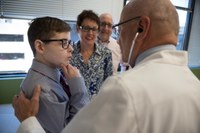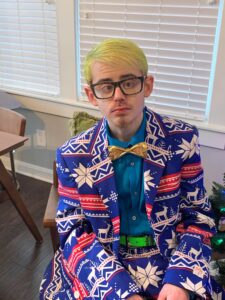A story of a young rare disease patient fighting over a decade for the answers to his illness.
By Jessi Corkran
Erdheim-Chester Disease most commonly affects adults between 40 and 70 years of age. However, as the disease becomes more well-known, it is sometimes discovered earlier in the life of a patient. Although this may be good news for those searching for a diagnosis, it also exposes the fact that physicians are seeing ECD patients that are affected much earlier in life.
This is certainly true for the young Noah Barone from Kentucky. Now at the age of 22, he has battled the disease for at least 16 years. At the very young age of about six years old, Noah began to have bulging, crossed eyes, and very bad headaches. The concerned parents brought him in for a consultation with an eye specialist that deemed the abnormalities as “lazy eye.” Thankfully, a family friend that is a doctor commented that this was more than a lazy eye and recommended an MRI test to see what was going on. From this, the first clue that something was seriously wrong emerged, they found lesions on his brain.
The next step for his care team was to call a neurologist at a local hospital for further testing. Surprisingly, ECD was mentioned, but because of his age and some tests that could not be done then, they ruled it out. Instead, the doctors performed biopsies and came back with a diagnosis of Inflammatory Pseudotumor of the brain.
“I remember the first time I was sent to the doctors at the hospital when my MRI came back showing lesions. There weren’t any beds for me at the hospital, we had to check-in through the ER. My mom and I sat in a chair for hours waiting to be able to get a room. I fell asleep with my head on her. I was only 6-7 years old. Little did I know it would bring this ECD journey,” Noah recalls. Mom and Dad were a bit more aware of what was going on, “The only word that comes to mind is ‘scared’ when we first heard ‘lesions in the brain.’ After that there was no time to think about it, we went into fighting it and praying for guidance.”
After 12 long years of not knowing the cause of these lesions and his pain, an answer finally came from a specialist in New York City at the cancer center Memorial Sloan Kettering. This is one of the most highly recognized ECD Care Centers in the US, led by a neurologist, Dr. Eli L. Diamond who delivered the diagnosis to the family in 2017. At this point, Noah was able to join a drug trial for ECD patients, stopping the disease from spreading and affecting his body even further. “[The] ECDGA is how I was able to find my ECD expert and get on a clinical trial that saved my life.”
Geneva, Noah’s mom, recollects how the possibility of an ECD diagnosis came about. “The doctors kept doing different tests and somewhere along the lines, ECD came into the picture. My husband and I found the [ECD Global Alliance] website and something drew me to Dr. Diamond so I emailed him with questions. He emailed me back and we had another biopsy done and sent to him. Where he found ECD markers to confirm it and we went to see him July 2017.”
Now he fights the damage the disease created in his body during the long wait for answers.

Salvatore Bertolone Jr., M.D., talks with 16-year-old Noah as parents Geneva and Mike Barone stand by and listen in.
Due to the rarity of ECD, which has been suggested to affect perhaps 2,000 people in the world, it is not uncommon for a patient to go undiagnosed for many years, (an average of 5 – 7 years has been noted in medical literature). Though Noah was on the unfortunate end of this spectrum, he noted that his doctor never gave up. As Noah’s most memorable care member, Dr. Salvatore Bertalone helped Noah and the family to stay positive and encouraged them to continue fighting. “He was always fighting for me and never gave up on me,” says Noah. “Even though we didn’t have a name for what I had then, he was able to treat me and keep me going until we found out what I had and how to treat it.”
Despite what Noah was facing as a teenager, he found a way to help others! He and Dr. Bertalone created a charity together named “Noah and Dr. B” that helped raise funds for other kids and families that had cancer. This fund helped parents with costs associated with travel, gas, and food; and it helped the clinic with entertainment costs and IV pumps. Noah has now moved his charity over to helping Dr. Diamond with ECD research!
“It is a tremendous honor when patients like Noah raise funds for ECD research. We are making the best possible use of this support to help ECD patients have the best possible outcomes,” Dr. Eli Diamond adds.
“ECD has taken away my independence. Even though I can’t do everything myself I stay focused on what I can do, which is my outlook on life with others. I never stop trying and I wake up and say ‘Life is worth dressing up for.’ So, I dress up and am thankful for the day.”
Noah enjoys music and fashion! “I try to go to concerts as much as I can. (Covid 19 has put a hold on that.) My best memory is going to ELO with my aunts in 2019.”
Noah wants readers to know, especially doctors, “Any age can have ECD. Also, if you don’t know, contact the experts on ECD to help the patient with a game plan as fast as possible. The faster you start treatment the least damage it can do.”
Noah also shares a message to his peers in the fight against ECD, “Don’t give up, keep fighting. The treatments they have now work and will make a difference in your life. Don’t be afraid to ask questions. Stand up for yourself.”
Noah, of course, is hoping one day for a cure. And we are right there with him!









